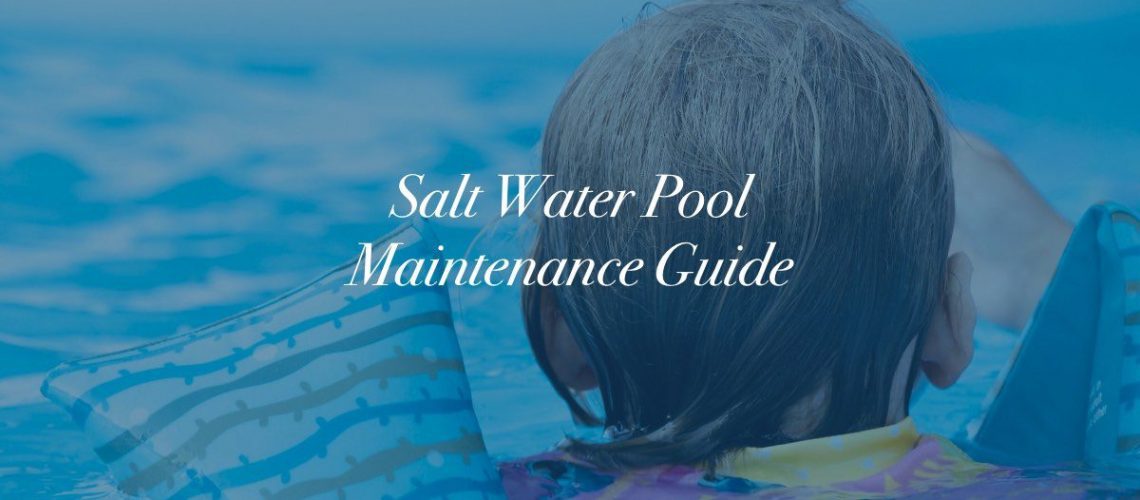The Complete Guide to Salt Water Pool Maintenance
There’s nothing more inviting than a sparkling clean, cool backyard pool on a warm day. But, all that enjoyment goes out the window without proper care and cleaning.
In fact, a dirty pool in your backyard can quickly transform into a swamp, harboring potentially dangerous waterborne illnesses and leaving your warm-weather dreams looking more like nightmares.
Sound familiar? If so, you’ve come to the right place! Read on for a complete guide to salt water pool maintenance, with simple instructions that even novice pool owners will find easy to follow.
Sanitation
The most important part of maintaining your backyard pool is sanitization which keeps algae, bacteria, and other microorganisms at bay. This is where your salt chlorination system comes into play, oxidizing and cleaning without all the harsh chlorine that comes with a traditional setup. Versus chlorine, the benefits of saltwater eliminate red eyes, make the skin feel softer and much more.
First, you’ll need to hire trained professionals to install the proper pool maintenance equipment, including filters and pumps, then comes the saltwater system. After, if you plan on maintaining your own pool, simply follow the manufacturer’s instructions and your tech’s advice to keep your entire pool system running efficiently to get the maximum results of a healthy, safe and crystal clear swimming pool.
Circulation and Filtration
Your pump should circulate all of the water in your pool through the filter once or twice a day. This typically requires running your pump for one hour per every 10 degrees of outdoor temperature. In Houston’s summertime heat, this can add up to eight or even nine hours per day!
Once you’ve established this baseline, you can monitor your water’s clarity and the accumulation of sediment to decide whether you need more or less circulation and filtration.
Pool Chemistry
Monitoring your pool’s salinity, chlorine levels, and pH are mandatory steps for salt system maintenance. And, any imbalance when it comes to your pool’s chemical composition can lead to big trouble. The salt level in the pool must be at the correct level to work efficiently so as to produce chlorine to kill bacteria and prevent algae growth.
Owners should set aside money in their pool maintenance budget to hire professional help when starting up a new saltwater system. The saltwater pool system can be more costly than chlorine, however, in the long run, a saltwater system will offer less maintenance and chemicals which will save money over time. It may also be helpful to have a professional pool service technician visit regularly to monitor these chemical levels.
Regular Pool Maintenance
Salt water systems require regular maintenance like emptying skimmer baskets and brushing and vacuuming the pool. You’ll also want to visually inspect the entire pool equipment system to catch small issues like built-up debris before they escalate into major problems.
Giving your pumps and filters a once-over every time you clean can help keep you from costly repairs and replacing salt system parts that have been neglected – and it only takes a few minutes!
Salt Water Pool Maintenance Made Simple
With this guide to salt water pool maintenance, you’re ready to take perfect care of your newly installed backyard oasis – and not a moment too soon! Summer will be here before you know it.
Are you dreaming of a big update for your existing pool? Hoping to add a spa, outdoor kitchen, or cool covered patio?
If so, BPS, The Backyard Pool Specialists has you covered! Our specialists have years of experience serving clients in the greater Houston area and beyond, and we’re happy to help you, too. Contact The Backyard Pool Specialists today or call (281) 890-3040 for a free, no-obligation quote.
We service the areas of Houston, Barker Cypress, Cypress, Conroe, Katy, Magnolia, Montgomery, Spring, Tomball, The Woodlands and beyond.



